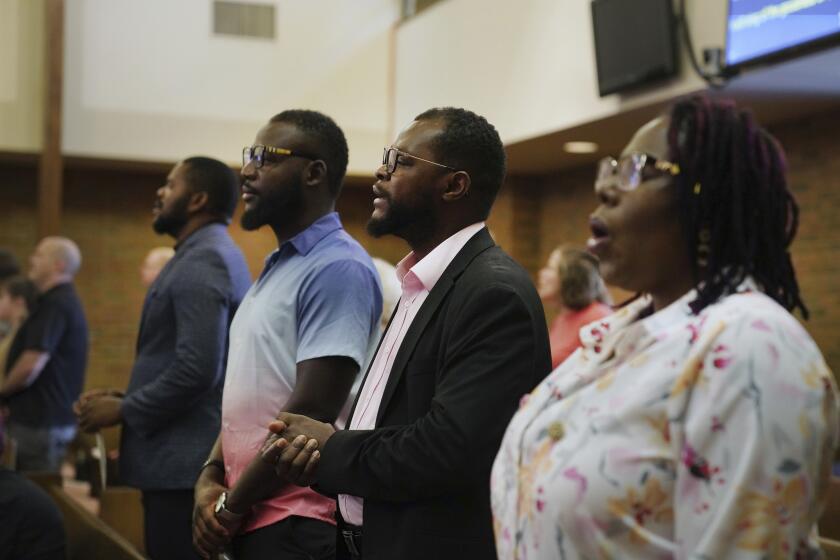In Zimbabwe, scandal topples Mugabe critic
A camera planted in the bedroom of Roman Catholic Archbishop Pius Ncube has felled President Robert Mugabe’s most prominent and outspoken critic in Zimbabwe.
The Vatican announced Tuesday that it had accepted Ncube’s resignation from his leadership post, which came after the Zimbabwean state media in July splashed lurid photographs and video footage of a naked man resembling Ncube in what they called his “love nest.”
The stories, and a civil lawsuit filed at the same time, accused him of having sex with a married woman, Rosemary Sibanda. They also claimed that Sibanda, a secretary for the Catholic Church, was not the only woman with whom he had broken his vows of celibacy.
Ncube’s resignation shocked and disappointed Zimbabwean Catholics, human rights organizations and regime opponents. Though Ncube will remain a bishop, the results are being viewed as a boost to Mugabe’s government and a deep blow to civil and religious groups that have long opposed human rights abuses, torture and killings of activists under Mugabe’s authoritarian regime. A broad-based movement had sprung up to defend the archbishop.
The resignation follows debilitating attacks by Zimbabwean security forces on opposition forces that began in March. The attacks, which have forced many to flee into exile, mirror a pattern seen before elections. Mugabe plans to run in presidential and parliamentary elections due in March.
Ncube on Tuesday released a statement in which he did not address the photos but described the scandal as “a state-driven, vicious attack” and vowed to continue fighting to defend human rights.
“I have not been silenced by the crude machinations of a wicked regime. I am committed to promoting the social teachings of the church and to working among the poorest and most needy in Zimbabwe,” the statement said.
“I know that there will be many of you who will be bitterly disappointed at my leaving my post as archbishop of Bulawayo and a few who will be delighted, seeing their mission has been accomplished.”
As archbishop of Bulawayo, Ncube dressed as humbly as the lowliest priest, sometimes fought back tears during sermons, and admitted he had prayed for the death of Mugabe, whom he saw as evil and corrupt.
In March, Ncube told a religious group that it was time for street protests. “It’s time for a radical stance,” he told the Zimbabwe Christian Alliance. “Not soft speeches and cowardice. . . . I am willing to stand in front.”
Many saw Ncube as a courageous and inspirational archbishop, who spoke out fearlessly about rights abuses while others remained silent or kowtowed.
Shari Eppel, a human rights activist who has worked closely with Ncube for 12 years, said the archbishop was tormented by the pain release of the photos has caused others.
“And the pain for people around here has been immense. I haven’t seen such emotion around an issue in Zimbabwe for a very long time,” she said.
Eppel said Ncube was not surprised by the Vatican’s decision.
“I think one of the most ironic things about this resignation is that he has done the honorable thing. We have a government which has tortured and murdered people with impunity for decades and we have never had a resignation.”
Selven Csetty, a spokesman in South Africa for the Solidarity Peace Trust, a human rights group jointly led by Ncube, said the resignation would free Ncube to concentrate on rights advocacy. He said the truth or falsity of the allegations was irrelevant.
The scandal broke just over a week after Mugabe, who is Catholic, had remarked that some priests “claim to be sworn to celibacy yet they sleep around with countless women,” a comment that Ncube’s supporters took as evidence of the regime’s hand in exposing Ncube.
In the past, Mugabe has called Ncube “satanic,” while other officials and the state media have called him a rapist and alleged that he is HIV-positive.
The scandal stories were published at the same time a $170,000 civil suit was filed by railway worker Onesimus Sibanda, Rosemary’s husband. Skeptics questioned how such a low-salaried worker could afford to hire a private detective, Ernest Tekere, who claimed to have planted the camera and collected the evidence.
“That man is a terrible womanizer,” Tekere was quoted as saying in the state-run Herald. “During the operation we saw several ladies coming to his room, women of all ages. There were old ladies, nuns and some young ones.”
Opposition newspapers and online sites published reports that Tekere was a former member of Zimbabwe’s secret police, the CIO.
David Coltart, a Bulawayo attorney and member of a splinter faction of the opposition Movement for Democratic Change, said the regime’s role in the affair was clear because only state telephone workers had access to the archbishop’s bedroom.
He also found it odd that several members of the state media were present when civil summonses were served on Ncube.
“I have never experienced, in 25 years as a practicing lawyer in this country, the media being aware of a civil summons that was just about to be served on an individual,” he said.
Father Oskar Wermter, a Jesuit priest in Mbare, one of the poor, crowded neighborhoods of Harare, the Zimbabwean capital, seemed surprised that Ncube was stepping down.
“It’s a great shock,” he said. “We didn’t expect this. The Zimbabwe bishops have recently showed their support for him in a statement, and ordinary Catholics have shown their solidarity.
“But the ruling party will be jubilant, and the state media will be jubilant. It will be a painful time for the church,” he said.
--
More to Read
Sign up for Essential California
The most important California stories and recommendations in your inbox every morning.
You may occasionally receive promotional content from the Los Angeles Times.










